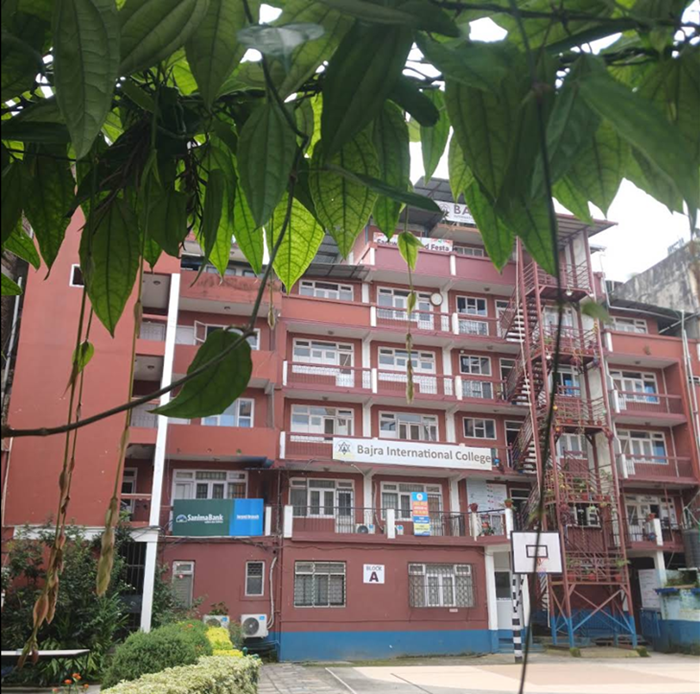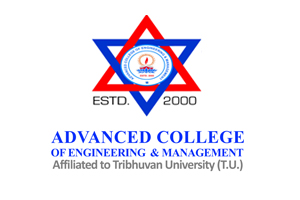Overview
Bajra International College (BIC), Boudha, Kathmandu, offers NEB (+2) programs and Tribhuvan University (TU) bachelor’s degrees for students in Nepal and abroad. BIC offers +2 Science, Management, Humanities, or Law under NEB; at the bachelor’s level, students can pursue TU-affiliated BBS, BA, BSW, and BCA.
BIC serves as an academic unit that runs NEB programs (at the school registry name “Saraswati Secondary School”) and TU bachelor’s degrees. The college highlights steady learning routines, close academic support, and opportunities for applied learning through labs, field visits, seminars, and clubs.
Quick Highlights
-
Established: 2004 AD
-
Location: Boudha, Kathmandu, Nepal
-
Affiliations: NEB (+2 programs as Saraswati Secondary School); Tribhuvan University (BBS, BA, BSW, BCA)
-
Programs: +2 Science, +2 Management, +2 Humanities, +2 Law; BBS, BA, BSW, BCA
-
Delivery: Classroom teaching, practical sessions, labs, projects, fieldwork (program-specific)
-
Facilities: Library, computer labs, Wi-Fi campus, multimedia classrooms, cafeteria, sports grounds, counseling, and conference spaces
-
Support: Merit-based and need-based scholarships (as per college policy and notices)
-
Student Activities: Subject clubs, events, publications, sports, social outreach

Academic Programs Offered
NEB (+2) Programs
+2 Science (2 years)
Built for students targeting STEM pathways. Classes typically include Physics, Chemistry, Biology/Computer Science, Mathematics, English, and Nepali. Practical lab hours focus on foundational experiments, lab safety, record keeping, and data interpretation. Graduates usually continue toward engineering, medicine, public health, agriculture, IT, or allied sciences.
Entry: SEE or equivalent with NEB criteria for Science. Math and Science performance at SEE matters due to subject intensity.
+2 Management (2 years)
Covers Accountancy, Economics, Business Studies, Optional Mathematics/Computer Science, English, and Nepali. Students learn basics of bookkeeping, market understanding, and organizational behavior through case exercises and presentations.
Entry: SEE or equivalent under NEB guidelines. Comfort with numbers and English supports progress.
+2 Humanities (2 years)
A broad route toward social sciences and the arts. Typical subjects include English, Nepali, Sociology, Psychology, Economics, and optional languages or computer studies. Activities feature reading circles, short surveys, and writing tasks.
Entry: SEE or equivalent under NEB rules. Reading habit and interest in society, culture, and policy is helpful.
+2 Law (2 years)
Introduces Nepalese legal system, civic rights, and basic legal writing. Students review acts and cases suited to high-school level. Graduates often enter BA/BSW, Law, or public administration at bachelor’s level.
Entry: SEE or equivalent under NEB criteria for Law. Interest in civics and argumentation supports learning.
Tribhuvan University (TU) Bachelor’s Programs
Bachelor of Business Studies (BBS) — 4 years
Focus on core business fields: Accounting, Finance, Marketing, Economics, Business Law, and Organizational Behavior. Students solve numerical problems, prepare project reports, and examine local markets. Internal assessments, terminal exams, and presentations are part of the routine.
Eligibility (as per general TU norms and college policy):
-
10+2 or equivalent in Management/Commerce; applicants from Science/Arts should have studied Mathematics or Economics as a full paper at intermediate level.
-
Minimum grade/percentage as per TU/college rule at time of admission.
Graduate Paths: Entry-level roles in accounting support, sales coordination, banking operations, SME management, and entrepreneurship; or further studies (MBS/MBA/Professional Certifications).
Bachelor of Arts (BA) — 4 years
A broad social sciences and humanities stream with majors/minors drawn from English, Nepali, Sociology, Economics, Rural Development, Psychology, and related fields (as available). The program strengthens academic reading, argumentation, research basics, and community project work.
Eligibility:
-
+2 or equivalent in any stream under TU admission rules.
Graduate Paths: Public service preparation, development agencies, content and media roles, teaching (with teacher-education credentials), community projects, or higher studies (MA).
Bachelor of Social Work (BSW) — 4 years
Social work theory, fieldwork, and research practice come together through classroom study and supervised placements. Students learn casework, group work, community organization, and proposal writing. Ethical standards and reflective journals are integrated into field components.
Eligibility:
-
+2 or equivalent in any stream; selection may include interview and document screening as per the college’s annual notice.
Graduate Paths: Entry roles in NGOs/INGOs, community development, public health outreach teams, research assistance, school counseling units, and social protection programs.
Bachelor of Computer Applications (BCA) — 4 years (8 semesters)
Coursework includes Programming (C/C++/Java/Python as per TU syllabus), Data Structures, Database Systems, Web Technologies, Software Engineering, Operating Systems, Computer Networks, and elective modules. Students complete lab tasks, minor projects, and a final project with documentation and viva.
Eligibility (as per TU and common college practice):
-
PCL/+2 or equivalent in any stream with minimum overall 40% or ‘C’ in all subjects or 2.0 CGPA (as applicable to the intake year).
-
Additional entrance score and merit order if mandated by TU/college circulars.
Graduate Paths: Junior software developer, web developer, QA trainee, database support, IT support roles; or further studies (MCA/MIT/Computer Science).
Admission Process
Annual Cycle:
-
Admission calls publish after national results and university notices.
-
Seats, cut-offs, and deadlines follow NEB/TU timelines and the college’s internal schedule.
Steps:
-
Inquiry and Counseling: Collect program sheets, course outlines, fee heads, and scholarship policy.
-
Form Submission: Submit the application with SEE/+2 transcripts, character certificate, recent photos, and ID copies.
-
Entrance/Screening (if applicable): For BCA and certain intakes, meet entrance/test requirements.
-
Merit List and Offer: Watch the notice board or official channels for results.
-
Document Verification and Fees: Provide original documents for verification.
-
Orientation and Class Start: Attend induction on academic rules, attendance, and assessment.
Teaching Faculty and Learning Methodology
-
Instruction: Subject teachers follow the approved NEB/TU syllabus with weekly plans and unit-wise targets.
-
Assessment: Internal tests, assignments, lab records, viva, field reports, and terminal exams.
-
Practice Components:
-
Science & BCA: Lab practicals, coding labs, debugging sessions, project demos.
-
BA & BSW: Field visits, interviews, focus-group discussions, short surveys, reflective journals.
-
BBS: Numerical practice sets, case tasks from local businesses, seminars on taxation and compliance.
-
-
Feedback: Timely feedback on drafts and lab notes; remedial classes when needed.
-
Academic Integrity: Guidance on citation basics, data handling, and report structure.
Infrastructure and Learning Facilities
-
Library: Textbooks, reference works, journals/periodicals (as available), reading zones for quiet study.
-
Computer Labs: Updated systems for programming, database practice, and research tasks.
-
Wi-Fi Campus: Internet access for research, e-learning, and collaboration (fair-use policy applies).
-
Multimedia Classrooms: Projectors and audio-visual tools support lectures and presentations.
-
Cafeteria: Clean seating and standard menu for daily use.
-
Sports & Recreation: Regular games; inter-class or inter-faculty events as scheduled.
-
Conference/Seminar Spaces: For workshops, guest lectures, and student presentations.
-
Counseling Desk: Academic guidance and basic psychosocial support with privacy.
Student Life and Campus Experience
-
Clubs and Societies:
-
IT Club: Coding practice, version control basics, tech talks.
-
Literary/Media Group: Writing, editing, short video/newsletter projects.
-
Social Work Unit: Community outreach, awareness events, field reflections.
-
Business Circle: Budgeting drills, mock presentations, compliance notes.
-
-
Events: Orientation, festival observances, alumni talk sessions, and research mini-fairs.
-
Community Links: Educational tours and neighborhood projects linked with coursework.
Extracurricular Activities (ECA)
-
Sports: Football, basketball, table tennis, and athletics as available.
-
Arts & Culture: Poetry, debate, music, and cultural days.
-
Academic Add-ons: Paper/poster presentations, quiz bowls, coding challenges, case discussions.
-
Service Learning: Clean-up drives, school visits, and information campaigns coordinated through program heads.
Scholarships and Financial Support
-
Merit-Based: Based on entrance rank, board scores, or semester performance (per college policy and seats).
-
Need-Sensitive Support: Partial waivers for eligible applicants upon document review.
-
Internal Awards: Semester toppers or winners of major academic competitions may receive support as notified.
-
Application Window: Before admission confirmation or within the window stated in the annual scholarship notice.
-
Documentation: Mark sheets, citizenship/ID, and any income or recommendation papers required by the college.
Always consult the latest scholarship circular for seat counts, criteria, and renewal conditions.
Achievements and Institutional Milestones
-
2004 AD: Establishment in Boudha, Kathmandu.
-
Affiliation Framework: NEB registration for +2 programs; TU linkage for bachelor’s degrees.
-
Student Activities: Ongoing academic seminars, presentations, and tours tied to coursework.
-
Publication Culture: Opportunities for student/teacher writing through in-house platforms or partner journals (as notified).
-
Facility Growth: Expansion of labs, multimedia rooms, and seminar spaces over time.
Why Choose Bajra International College?
-
Affiliation Clarity: NEB for +2 and TU for bachelor’s degrees provide recognized academic routes.
-
Program Breadth: Science, Management, Humanities, and Law at +2; BBS, BA, BSW, BCA at bachelor’s level.
-
Learning Support: Practical sessions, field activities, seminars, and feedback.
-
Facilities: Library, labs, Wi-Fi, conference rooms, counseling, and sports grounds.
-
Location: Boudha, with access to city resources and a focused campus setting.
-
Structured Admission: Clear steps, document verification, and orientation.
Conclusion
BIC offers a clear path from +2 to bachelor’s studies under recognized boards and university frameworks. The campus blends classroom learning with practice-based tasks, making it suitable for students who want steady routines, supportive teaching, and access to standard facilities in Kathmandu.
FAQ
1) What boards and universities is the college linked with?
NEB for +2 programs (as Saraswati Secondary School) and Tribhuvan University for bachelor’s degrees (BBS, BA, BSW, BCA).
2) Which bachelor’s programs are offered?
BBS, BA, BSW, and BCA under Tribhuvan University.
3) How long are the bachelor’s programs?
Most current TU bachelor’s programs at the college run for 4 years. BCA follows an 8-semester structure across 4 academic years.
4) What are the basic +2 entry requirements?
SEE or equivalent under NEB rules. +2 Science needs stronger grounding in Math and Science; other streams follow NEB criteria.
5) What are the common BBS/BA/BSW entry rules?
+2 or equivalent. BBS applicants from non-commerce streams should have studied Mathematics or Economics as a full paper at intermediate level.
6) What is the minimum entry for BCA?
PCL/+2 or equivalent with at least 40% or ‘C’ in all subjects or 2.0 CGPA (as per prevailing TU/college rules for the intake year), plus entrance if required.
7) Are scholarships available?
Yes—merit-based and need-sensitive support as per annual college notices. Check the latest circular for criteria and seats.
8) Which facilities are on campus?
Library, computer labs, Wi-Fi, multimedia classrooms, cafeteria, conference spaces, counseling, and sports areas.
9) Is there fieldwork for BSW?
Yes—guided placements, community tasks, and reflective reports form part of the BSW routine.
10) What should I prepare for admission?
Application form, SEE/+2 transcripts and certificates, passport-size photos, ID/citizenship copies, and any documents required for scholarship consideration.
Contact Bajra International College's administrative office for detailed information on the course, admissions, location, fees, scholarships, facilities, counseling, or eligibility. You can also stay updated, share reviews, explore academic courses, ask questions, and join discussions.
Contact Details
Bajra International College
Email Address: info@bajracollege.edu.np
Phone Number: +977-1-4915415



















You need to login to comment.